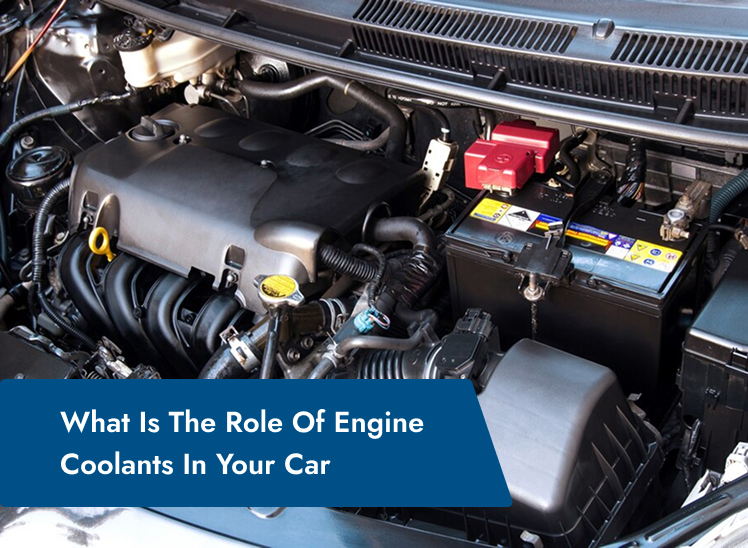What Is The Role Of Engine Coolants In Your Car

What Is The Role Of Engine Coolants In Your Car
To make sure that a longer life for a car regular maintenance needed. The car maintenance is required from basic car wash to oil quality check and changing essential lubricant and coolants.
Coolant is known as an antifreeze for car are combination of water and glycol and ensure that engine stay at a optimal temperature. In this article let’s understand how to choose right coolant for your car, and normal coolant oil price.
Let’s Start With The Basic
What Is Car Engine Coolant?
Basically, car coolant works as an antifreeze, which ensures that the car engine can maintain its optimal temperature. It also prevents the engine from overheating in hot conditions. Coolant protects the engine from overheating, and lubricant moves parts to prevent damage. It is used in conjunction with a liquid cooling system, which include components such as a radiator, water pump.What Does Engine Coolant Do?
Coolant transfers heat and adds antifreezing protection to an engine, so your car engine running smoothly in difficult situation. It moves heat away from engine parts and releases it through the radiator as it passes through the engine and radiator. Additionally, coolant includes chemicals that guard against scale accumulation inside the cooling system, lubricate moving elements like the water pump, and stop corrosion.Types Of Coolant
Mordern engine coolant is a combination of water and glycol, along with additive which enhance the performance and longevity. These additives include anti-foaming agents, lubricants, corrosion inhibitors, and pH buffers. Depending on the environment the coolant is intended for, the water-to-glycol ratio changes. There are two types of coolants for cars available: Ethylene Glycol: it is a traditional coolant offers excellent heat transfer properties and is widely used in colder climates due to its lower freezing point. Propylene Glycol: it is a environment friendly and less toxic compareto traditional glycol. It is used when the environment safety is first priority.A Key Point To Highlight About Engine Coolant
Temperature Control: Preventing Engine Overheating
The essential purpose of engine coolant is exactly what its name suggests: to maintain engine temperature. The combustion process within your engine produces tremendous heat levels. If the cooling mechanism isn't functioning properly, this intense heat would rapidly cause essential engine parts to deteriorate, deform, and eventually fail. The coolant flows through your engine's core, capturing excess thermal energy. It then moves to the radiator, where this heat disperses into the surrounding air, before cycling back to the engine again. This ongoing process maintains the engine's temperature within acceptable operational limits.Past Freezing: Safeguarding Against Heat
Though antifreeze is frequently referenced, coolant's capacity to elevate boiling temperatures is equally crucial, particularly in hot environments. Coolant mixtures incorporate elements that increase water's boiling temperature. This stops the fluid from vaporizing inside the engine, which would create vapor bubbles, reducing cooling effectiveness and potentially causing significant engine harm. Consider this example: water vaporizes at 212°F (100°C). Your engine typically operates at temperatures exceeding this point. Without proper coolant, your cooling system's water would vaporize, generating steam and compromising the entire cooling mechanism.Anti-Corrosion: Preventing Oxidation
Engine coolant serves another vital purpose: safeguarding your cooling system components from oxidation. The cooling mechanism comprises different metals, including aluminum, copper, and iron, which naturally corrode when they contact water and oxygen. Coolant includes anti-corrosion agents that create a defensive barrier on these metallic surfaces, stopping their interaction with water and oxygen. This protection helps preserve your radiator, water pump, hoses, and other crucial components.Lubrication: Supporting Water Pump Operation
Contemporary coolants typically include lubricating agents that protect the water pump. This pump ensures coolant circulation throughout the system. The coolant's lubricating properties help maintain the water pump's bearing lubrication, minimizing deterioration and extending operational life.Selecting Appropriate Coolant: Distinct Variations Exist
Using the correct coolant type for your vehicle is crucial. Various manufacturers require specific coolant types, each featuring unique chemical compositions and protective characteristics. Incorrect coolant selection may result in corrosion, seal damage, and decreased cooling performance. Using the correct coolant type for your vehicle is crucial. Various manufacturers require specific coolant types, each featuring unique chemical compositions and protective characteristics. Incorrect coolant selection may result in corrosion, seal damage, and decreased cooling performance.Upkeep Importance: Consistent Monitoring and Replacement
Engine coolant deteriorates with use, becoming less effective at preventing corrosion, maintaining proper boiling point, and stopping freezing. Regular coolant system flushes are necessary to remove degraded coolant and introduce fresh fluid. Monitor your coolant levels consistently, and replenish when necessary. If you detect rust particles or contamination in the coolant, schedule a system flush immediately. Looking For The Best Engine Oil Manufacturer Visit: GARS LubricantEvolution Of Cooling Technology
The automotive industry continues to grow, shaped by technological innovations and sustainability requirements. The evolution of cooling mechanisms in engines demonstrates notable progress in recent times:- Aluminum Radiators: aluminum units have superseded copper-based radiators, delivering enhanced cooling performance while reducing vehicle weight and boosting fuel economy.
- Coolant Additives: additive formulations now deliver superior protection, extending service life and guarding against rust, deposits, and temperature variations.
- Electric Cooling Fans: Contemporary vehicles increasingly utilize electrically-powered fans rather than belt-driven systems, enabling precise temperature management while reducing power demands.
- Coolant Recycling: Growing environmental consciousness has spurred the development of reusable cooling fluids that reduce ecological impact without compromising effectiveness.
